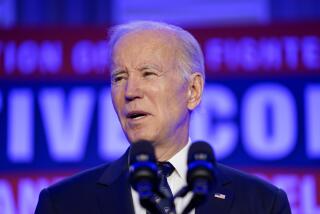Plan to Hike Medicare, Benefit Taxes Rejected
- Share via
WASHINGTON — The House Ways and Means Committee on Monday dismissed a proposal that would have increased Medicare premiums across-the-board and imposed higher Social Security taxes on people earning more than $50,000 to help finance catastrophic health care for the elderly.
The committee will return today to hear whether its chairman, Rep. Dan Rostenkowski (D-Ill.), can find a way to break the impasse that has developed over how to pay for the new program. The increased coverage is popular, but Congress’ plan for financing it has produced a backlash among some elderly voters.
Rostenkowski told reporters that he will offer a proposal aimed at modifying the catastrophic care program and extending certain expiring tax breaks without relying on the capital gains tax cut favored by President Bush. When asked why he rejected Bush’s capital gains proposal, Rostenkowski replied: “Because I’m a Democrat.”
Fear Voters’ Wrath
The committee is drafting a $5.3-billion tax bill to help cut next year’s budget deficit. In the process, it has been struggling to respond to a revolt among lawmakers who fear the wrath of elderly voters as a result of a surtax already imposed by Congress to help pay for the new Medicare program.
Members of the panel acknowledged that there is no consensus on how to respond to the political groundswell of opposition to the new taxes on the elderly that were approved by Congress last year. Under the law, the bulk of the cost of the new program, which was intended to be self-financing, would be borne by the 40% of the elderly who have enough income to pay federal taxes. They initially would pay, on a sliding scale, a surtax of up to $800 per person.
In an effort to eliminate the unpopular surtax, committee members were presented with an alternative prepared by Reps. Pete Stark (D-Oakland) and Bill Frenzel (R-Minn.). Their plan would have required all Medicare beneficiaries to pay more and would have scaled back some of the benefits of the program. It also would have required some current workers to pay higher Social Security taxes.
Stark appeared to offer the proposal in part as a ploy to show lawmakers how difficult it would be to change the financing plan approved last year.
Under this formula, which Stark himself almost immediately disavowed, people earning more than $50,700 next year would have to pay an additional 1.45% tax on annual earnings of up to $90,000. Employers would also have to pay a matching 1.45% tax on such earnings.
Currently, most employees pay a 7.51% Social Security tax, matched by their employers, on earnings of up to $48,000. The $48,000 ceiling is scheduled to rise to $50,700 next year.
Of the 7.51% tax, 1.45% is used to help finance the hospitalization portion of Medicare. By raising the amount of income subject to the 1.45% tax to $90,000 as the Stark-Frenzel plan proposed, the federal government could generate an additional $1.4 billion next year and $4.4 billion in fiscal year 1991. Under the plan, that would have replaced part of the roughly $7 billion a year that the already-approved surtax is supposed to raise.
The proposal, however, was condemned by nearly all members of the committee. Some lawmakers objected to the additional $3.50 in monthly premiums that all 32 million Medicare recipients would have been required to pay to ease the burden on the much smaller number of relatively affluent retirees. Others said that it was wrong to shift the burden from Medicare beneficiaries to current workers.
Many members of the committee, including Rostenkowski and Stark, would prefer to leave the catastrophic care program intact, but they are worried that House members might undercut their power by demanding a floor vote on the issue.
More to Read
Get the L.A. Times Politics newsletter
Deeply reported insights into legislation, politics and policy from Sacramento, Washington and beyond. In your inbox twice per week.
You may occasionally receive promotional content from the Los Angeles Times.










